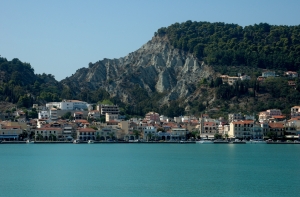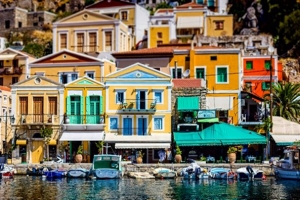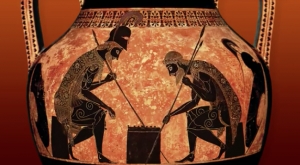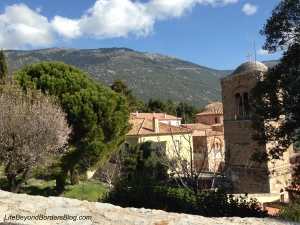BUSINESS CENTRE
XpatAthens
Thursday, 12 May 2016 07:00
Greek Island Hopping Made Cheap Thanks To New Pass
Planning your summer getaway to the Greek islands? Thanks to a new pass offered by Attica ferries and the affordable train service, the Interrail Greek Islands Pass allows guests to hop on and off ferries and discover 4 from a selection of 27 Greek islands across the Aegean sea. Those who want to add on more destinations have the option of doing so with a 30 percent discount.
The travel pass, which was launched in 2015, aimed to entice visitors to island hop using the Superfast Ferries. Included in the 27 different islands to choose from are Anafi, Amorgos, Astypalaia, Chios, Crete, Donoussa, Ios, Iraklia, Kalymnos, Kastellorizo, Kos, Koufonissi, Leros, Lesvos (Mytilene), Lipsi, Mykonos, Naxos, Nisyros, Patmos, Paros, Rhodes, Santorini, Schinoussa, Symi, Syros, Tilos and Tinos.
Holders of the pass are also offered a choice of 2 international ferry trips between 3 ports in Italy: Ancona, Bari, or Venice and 3 ports in Greece: Corfu, Patras and Igoumenitsa.
The pass costs just 240€ for first class travel, and 172€ for second class for adults over 25 years, with prices slashed for those who are under 25 years of age to 210€ for first class and 156€ for second class, whereas children under 11 years of age travel for free.
The pass costs just 240€ for first class travel, and 172€ for second class for adults over 25 years, with prices slashed for those who are under 25 years of age to 210€ for first class and 156€ for second class, whereas children under 11 years of age travel for free.
This pass is for EU travellers only and there are some restrictions: http://www.interrail.eu/help/ordering-pass/do-i-need-interrail-or-eurail-pass. For more information about travel in Greece visit: http://www.interrail.eu/destinations/greece.
Source: Greek Reporter
Published in
Greece In The News
Tagged under
Tuesday, 10 May 2016 07:00
The Best Of The Greek Islands
With so many Greek islands to choose from, it's hard to know which one would be the best for you. Conde-Nast Traveler recruited a frequent islander-goer, Rachel Howard, to give us some of her favourites! Here are just a few.
Hydra
Best Greek island for: a long weekend with the art crowd
Less than two hours from Athens, Hydra fills up with chic Greeks on the weekends. Wily cats and weary donkeys patrol the back alleys, but all the action happens along the waterfront.
Car-free and protected by a preservation order, Hydra has always been an artists' muse. Leonard Cohen, Brice Marden and Juergen Teller have homes here.
Corfu
Best Greek island for: cosmopolitan cachet and lush landscapes
Corfu is the It Girl of the Ionian. The cosmopolitan capital is a charming clash of Venetian, British, and French colonial influences. With its pastel villages, rolling olive groves and grand manor houses, the rest of the island recalls Tuscany - but with far better beaches.
Mykonos
Best Greek island for: Decadent parties and five-star hotels
Mykonos has seduced glamorous hedonists since the 1960s. It had gay clubs and sunrise parties before rave culture was even invented. Its bohemian allure has never faded, although nudist beaches now have nail bars, personal trainers and house music pumping out all hours. The influx of supermodels and superyachts has inspired ever more decadent resorts and restaurants.
Symi
Best Greek island for: Castaway coves and a picture-perfect port
Little Symi has the prettiest port in Greece. As you round the headland, neoclassical mansions in every shade of apricot and peach rise like a mirage from the sea. Built by 19th-century sponge and spice merchants, the whole town is now a national monument.
With its laid-back glamour, luminous sea and almost tropical microclimate, Symi is a hit with French and Italian yachties. You will see them eating shrimp at a local taverna by the harbour, while in the rugged hinterland, more than 100 monasteries are hidden among the pine and cypress forests.
Crete
Best Greek island for: Antiquities, active adventures, and sunshine all year round
Greece's largest island, Crete has ancient ruins, snow-capped peaks and beaches galore. Sunshine is pretty much guaranteed year round, but spring is especially lovely for rambling and sightseeing.
Time slows almost to a standstill in the mountain villages, where locals with formidable whiskers welcome you with shots of raki (Cretan grappa) for breakfast and celebrate saints' days with a volley of gunshots.
To read more of Rachel's top picks for best Greek islands, please visit: Conde Nast Traveller
To read more of Rachel's top picks for best Greek islands, please visit: Conde Nast Traveller
Published in
Travel Greece
Tagged under
Tuesday, 10 May 2016 07:00
Greek Islanders Snub Plastic Bags
Sifnos, among other Greek islands, have started the initiative to decrease the usage of plastic bags by charging 10 cents per bag. The initiative, which began on Sifnos island and named the ‘Do it Like a Sifnian’ act, hopes to encourage people to use reusable material pouches or bags instead of plastic.
Sifnos Island Cooperative (SIC) started awareness-raising programs back in 2015 by visiting local schools and distributing multi-purpose bags. The project quickly gained traction and is now winning over the trade industry among others. Even the island’s Association of Professionals and Traders and the municipality have joined in the effort by raising awareness at school educational events and hosting community gatherings.
In addition to the effort Sifnos is making in the reduction of using plastic bags, they are also exploring ways to make the island self-sufficient in energy by using renewable resources like the wind and sea water.
Source: Greek Travel Pages
Published in
Local Environment
Tagged under
Monday, 09 May 2016 07:00
Top Spots For The Best Views Of Athens
Travel blogger, author, and Athens local, Marissa Tejada, shares her favorite spots and tips for the best panoramic views of Athens!
1. Acropolis
The eternal landmark of this ancient city owns some of the most spectacular views around. Built on a hill, with nothing higher around it, you get an amazing panorama of the Greek capitol. A short hike is the only way to get you up to the top of this unique, majestic wonder of the world.
The eternal landmark of this ancient city owns some of the most spectacular views around. Built on a hill, with nothing higher around it, you get an amazing panorama of the Greek capitol. A short hike is the only way to get you up to the top of this unique, majestic wonder of the world.
Walking Tip: Check out Mars Hill/Aeropagus. Great views on this rock next to the Acropolis where St. Paul once preached. Talk about standing on history!
2. Filopappos Hill
Take a leisurely walk through the paths of the hill to reach its full height of 147 meters. From that vantage point, a full view of the Acropolis awaits. Look to the south, and for a view of the Aegean Sea. The park around the hill is lovely.
Walking Tip: It is a public park, so there isn’t an admission fee to walk around. There are various entrances to the hill. You can walk right into the hill at the end of Dionysioiu Areopagito pedestrian way.
3. Strefi Hill/Lofos Strefi
Located in in the neighborhood of Exarcheia, the view at the top is of both the Acropolis and Lycabettus Hill. This choice of best view is because it is not a real touristy spot. Here, you can take in a pretty view and be among where locals trek.
Walking Tip: Closest metro is Omonia. One way to get there is to walk up Emannuel Benaki street all the way until you see the hill and follow a path up.
To read Marissa's article in full, please visit: My Greece My Travels
To read Marissa's article in full, please visit: My Greece My Travels
Published in
City Discovery
Tagged under
Monday, 09 May 2016 07:00
Greece’s Broadcaster Launches Arabic Programming For Refugees
The Greek state broadcaster from ERT TV has launched their own Arabic news bulletin called ‘News for Refugees’ in response to the increase of Middle Eastern and North African refugees. The bulletin aired on radio and TV in March 2016 and is in collaboration with ANA-MPA, a state news agency.
The news bulletin aims to cover the urgent need in useful, official and reliable information in Arabic for the 50,000 refugees and migrants in Greece right now. When the first bulletin aired, approximately 30,000 people tuned in to listen.
In addition, ANA-MPA launched a new website in Arabic providing news and other useful information for migrants and refugees. The site's content includes useful tips, links, guidelines and announcements issued by the Coordinating Body for Refugees.
Prime Minister Alexis Tsipras commended the decisions by ERT and ANA-MPA to offer news in Arabic in order to help refugees in Greece.
To read this article in full, please visit: Greek News Agenda
Published in
Local News
Tagged under
Thursday, 05 May 2016 07:00
Great Parks In Athens For Kids & Spring Picnics
Spring is in full swing and there's no better time to enjoy an outdoor picnic with the kids!
Celeste Tat, from Family Goes Out Greece, gives her expertise on great parks to enjoy a picnic in Athens. Below are some of her favourite spots. Also, click here to read about child friendly parks in Athens.
Celeste Tat, from Family Goes Out Greece, gives her expertise on great parks to enjoy a picnic in Athens. Below are some of her favourite spots. Also, click here to read about child friendly parks in Athens.
National Garden, Athens centre
Address: The main entrance is on Amalias Avenue but you also enter the garden from Vasilissis Sophias Avenue, Herodou Attikou street and the Zappeion park area.
The National Garden, formerly called the ‘Royal Garden’, is a public park of 15.5 hectares in the centre of Athens. It is located directly behind the Greek Parliament building (the old palace) and in between the famous monuments of the Zappeion and the Panathenaiko first Olympic Stadium.
The National Garden, formerly called the ‘Royal Garden’, is a public park of 15.5 hectares in the centre of Athens. It is located directly behind the Greek Parliament building (the old palace) and in between the famous monuments of the Zappeion and the Panathenaiko first Olympic Stadium.
I find it an ideal cool oasis and a green escape in the middle of the city centre for a hot summer day. My kids always love the huge and impressive palm trees at the entrance of the park. Inside the National Garden you will find a little farm with animals and birds and a pond with turtles. There is also a nice playground with a large sandbox. There are impressive botanic gardens, a labyrinth of rare plants and trees and plenty of open grass areas and benches to have a picnic.
Syngrou Estate in Maroussi
Address: 182 Kifissias Avenue, Maroussi
Syngrou Estate is best described as an area of unspoiled countryside where you will forget that you are near the centre of the capital city. The land belonged to Andreas Syngrou, a successful and wealthy businessman. What I love about the very well kept park of Syngrou Estate is the variety of trees and shrubs, the pathways for bicycles and open areas. There are expanses of grass for picnics and ball games.
Syngrou Estate is best described as an area of unspoiled countryside where you will forget that you are near the centre of the capital city. The land belonged to Andreas Syngrou, a successful and wealthy businessman. What I love about the very well kept park of Syngrou Estate is the variety of trees and shrubs, the pathways for bicycles and open areas. There are expanses of grass for picnics and ball games.
Kaisariani Forest & Monastery, Kaisariani
Address: Alimou-Karea Avenue, Kaisariani
Kaisariani forest is located 5 km from the Athens city centre up and around the forest of Mount Ymittos. The park has many footpaths, beautiful trees, many birds, old churches, ruins and rocks. There is a botanical garden as well and there are large grass areas with picnic tables and benches. There are endless possibilities in this park, both in the sun and in the shade. There are bicycle paths, a playground and a café too. A picnic in this park can be combined with a visit to the Kaisariani Monastery.
To read this article in full, please visit: Family Goes Out Greece
Kaisariani forest is located 5 km from the Athens city centre up and around the forest of Mount Ymittos. The park has many footpaths, beautiful trees, many birds, old churches, ruins and rocks. There is a botanical garden as well and there are large grass areas with picnic tables and benches. There are endless possibilities in this park, both in the sun and in the shade. There are bicycle paths, a playground and a café too. A picnic in this park can be combined with a visit to the Kaisariani Monastery.
To read this article in full, please visit: Family Goes Out Greece
Published in
Kids Life
Tagged under
Thursday, 05 May 2016 07:00
Mid-Season Sales In Athens
Starting a day later than previous years because of the Labour Holiday, Mid-Season sales in Athens began on Wednesday, May 4th. Retailers in Athens will have their sales for one week, ending on May 10th, so get your shopping bags ready!
Stores will also have the option to stay open on Sunday, May 8th, from 11:00 to 20:00. This applies mainly to larger retail stores and those on busier streets like Ermou in downtown Athens. Source: ANA/MPA
Published in
Local News
Tagged under
Tuesday, 03 May 2016 07:00
Panoply Vase Animation Project Makes Greek Culture Come Alive
What if you could see the original artwork depicted on ancient Greek vases come alive in a series of animated pictures? Sonya Nevin, co-creator of the Panoply Vase Animation Project alongside with Steve K. Simons, talks to Greek TV all about Panoply. Below is a snippet of an interview with Sonya Nevin and Michael Klioumis about the concept of Panoply and the usage of animation on vases.
M.K: How did you come up with the concept of Panoply?
S.N: It was during my doctorate at University College Dublin. Steve (i.e. Steve Simons – Panoply’s animator) and I started messing around making stop-motion ancient world stories with toy-figurines, just for fun. I showed at a few student society events and they got a great response. Then I heard from teachers that some of them were showing the animations in school. So we decided to push the ancient-world animation concept further. The idea of working with vase scenes came to us and really began to explode the potential of what we were doing. From there we began working on getting the movement right and on ways they could be beneficial in museums and beyond.
M.K: Can you tell us about the uses of the animations on vases?
S.N: In the Ure Museum in Reading, UK, and in the University College Dublin Classical Museum in Ireland, museum visitors can watch animations alongside the vases they were made from. I absolutely love that. It encourages people to look again at the vases – to understand the scenes, to feel their movement, and to think creatively about what the artists chose to depict.
To read the article in full, please visit: Greek TV
M.K: Can you tell us about the uses of the animations on vases?
S.N: In the Ure Museum in Reading, UK, and in the University College Dublin Classical Museum in Ireland, museum visitors can watch animations alongside the vases they were made from. I absolutely love that. It encourages people to look again at the vases – to understand the scenes, to feel their movement, and to think creatively about what the artists chose to depict.
To read the article in full, please visit: Greek TV
Published in
Greek Language & Culture
Tagged under
Tuesday, 03 May 2016 07:00
Greece Among Top 6 Places To Visit In May
Just in time for spring and the national holiday of Protomagia, Greece is on the list of top destinations to travel to in May!
The esteemed Conde Nast Traveler has listed only 6 six destinations for the best May travel and Greece has made it to the number 1 spot.
Conde Nast urges its readers “not to limit their trip to popular destinations like Mykonos and Santorini, but wander the lesser-frequented harbors of Hydra or hike through the verdant forests of Zagorohoria.”
Other destinations included on this list were the South of France, Portugal, and South Africa.
Other destinations included on this list were the South of France, Portugal, and South Africa.
Source: Conde Nast Traveler
Published in
Greece In The News
Tagged under
Monday, 02 May 2016 07:00
Hidden Places To Explore In Greece
Travel blogger and author Rebecca Hall, tells us about her recent 'hidden Greece' adventures - some of the beautiful places that not many travellers know to venture to.
Around Parnassos
Parnassos is a limestone mountain in central Greece and the ancient Oracle and town of Delphi can be found at its base. Not many tourists who travel to Greece will equate the country with skiing, but that’s exactly what you can do on Parnassos because at 2,457m high, it offers good ski facilities in the winter.
Most people stay in the mountain town of Arachova. Think of it as an apres ski town; alive in the winter with ‘beautiful people’ - yet in the spring offering lovely wooden chalets, private accommodations with views to the distant Peloponnese region.
Karikion Andro Cave (the Cave of Panas)
About a 20 minute drive from Arachova and Delphi; up, up, up into the pine woodland and suddenly the cave is there. The area offers sweeping views out as far as the seaside village of Galaxidi (yes, it’s possible to be skiing or in the mountains one minute, then soaking up the sun by the sea within half an hour in this area of Greece).
Caves, traditional villages, mountain countryside, an off-the-map UNESCO monastery, if you’re looking for a completely different side of this every magical, changing country, you can’t go wrong in booking a Hidden Tour of Greece.
Local Villages
My private, tailor-made tour also included visits to small villages where I encountered local people weaving using the traditional methods, wine tasting from the various vineyards in the area - and a visit to the Bread Museum of the town of Amphiklia (who knew bread could be so interesting? I certainly didn’t).
I would discover that ‘luxury’ did not have to mean a five-star resort on a beach - it’s about the richness of the experiences had...how deep one goes into a culture. That, for me, is luxury.
Originally posted on Huff Post Travel. To read more from Rebecca, please visit: Life Beyond Borders
Caves, traditional villages, mountain countryside, an off-the-map UNESCO monastery, if you’re looking for a completely different side of this every magical, changing country, you can’t go wrong in booking a Hidden Tour of Greece.
Local Villages
My private, tailor-made tour also included visits to small villages where I encountered local people weaving using the traditional methods, wine tasting from the various vineyards in the area - and a visit to the Bread Museum of the town of Amphiklia (who knew bread could be so interesting? I certainly didn’t).
I would discover that ‘luxury’ did not have to mean a five-star resort on a beach - it’s about the richness of the experiences had...how deep one goes into a culture. That, for me, is luxury.
Originally posted on Huff Post Travel. To read more from Rebecca, please visit: Life Beyond Borders
Published in
Travel Greece
Tagged under











